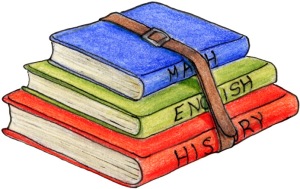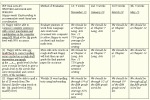I’m taking my first course just now towards my doctorate degree in Educational Administration. It’s actually pretty easy stuff. The writings are scholarly (no surprise there)  but not difficult to figure out after I re-read parts of them once or twice. What interested me were our readings this week about what makes a good school versus a bad school. I heard all these lovely sentiments in class discussions. Then I read the articles and I liked them a lot more than the input from my colleagues. Why? Because there is no way a person can define in simple, clear terms what a good school is in one sentence or less. No one. And the articles don’t attempt to do that.
but not difficult to figure out after I re-read parts of them once or twice. What interested me were our readings this week about what makes a good school versus a bad school. I heard all these lovely sentiments in class discussions. Then I read the articles and I liked them a lot more than the input from my colleagues. Why? Because there is no way a person can define in simple, clear terms what a good school is in one sentence or less. No one. And the articles don’t attempt to do that.
In fact one of the articles stated it is almost impossible to define what a good schools is and it is much easier to define what it isn’t. The articles I read were written within different theoretical frameworks of course but I expected that at this level. That doesn’t mean I have to agree with them. One of the most interesting articles was the application of neoliberalism to local schools and Ontario education. Neoliberalism. You gotta love that word. I still don’t know what the heck it means but I know what it defines.
Neoliberalism is a view of the education system in light of the province’s social economy, privatization, and in particular, powerful politic influences that occasionally impose educational reform on the province. It states that politicians pretty much dictate how our education system is going to look since they formulate curriculum and provide funding to deliver that curriculum. The budget has to account for various expenditures that generally reflect the curriculum at work in the schools, so I’m inclined to agree that it is the powers that be that create both good schools and bad schools.
The framework states that politics determines funding for schools and how much schools  need to turn to the school community for financial assistance. For instance, when Mike Harris, the evil Conservative, cut $50 million dollars from the special education budget over 4 years of his first term in office, a lot of children in need of special services suffered. The cut affected such issues as purchasing assistive devices (eg. special computers), reduced the number of teacher assistants to help children to learn and remain in the classroom (inclusion), and it increased the number of special needs students who worked with special education teachers. This is a problem because the whole point of withdrawing children from class (exclusion) is to have them work in small groups, thereby receiving more teacher attention. When class sizes increased and the hiring of teachers froze, these groups became much larger and tutoring all but vanished. These are direct results of the social economy affecting education.
need to turn to the school community for financial assistance. For instance, when Mike Harris, the evil Conservative, cut $50 million dollars from the special education budget over 4 years of his first term in office, a lot of children in need of special services suffered. The cut affected such issues as purchasing assistive devices (eg. special computers), reduced the number of teacher assistants to help children to learn and remain in the classroom (inclusion), and it increased the number of special needs students who worked with special education teachers. This is a problem because the whole point of withdrawing children from class (exclusion) is to have them work in small groups, thereby receiving more teacher attention. When class sizes increased and the hiring of teachers froze, these groups became much larger and tutoring all but vanished. These are direct results of the social economy affecting education.
Turning to outside agencies for financial assistance is another. Selling chocolates door to door, gaining sponsorship from sports shops for softball or basketball teams, and ordering bulk pizzas for pizza days at reduced prices with a local pizza restaurant are all examples of external agencies that are very necessary to help fund school activities. There’s nothing wrong with community involvement in schools. In fact, it’s vital and provides a great experience for the children. But the need for financial donations and support from the community arose from the severe cuts in educational funding that began in Canada between 1978 – 1982. Government withdrew significant financial funding for schools and left schools to work with capital enterprise in order to keep afloat.
 This is the system neoliberalism doesn’t like much. The theory states it is biased and, depending on the poverty or wealth of a school community, there is great inequality in funding for schools in different regions. That makes a lot of sense. Low-income neighborhoods are not able to donate money or purchase goods from schools to the same profit as schools in high-income neighborhoods. Is this a disadvantage for low-income school communities? You bet.
This is the system neoliberalism doesn’t like much. The theory states it is biased and, depending on the poverty or wealth of a school community, there is great inequality in funding for schools in different regions. That makes a lot of sense. Low-income neighborhoods are not able to donate money or purchase goods from schools to the same profit as schools in high-income neighborhoods. Is this a disadvantage for low-income school communities? You bet.
The powers that be determine how financially profitable a school will be during a given academic year. The “profit”, btw, is directed back into the schools. Money from pizza lunches and bake sales purchase text books and technology. No one pockets a fatty paycheck. Not unless you’re a crook. Neoliberalism is all about the capital market that discriminates against the many and benefits the few. It sounds quite Marxist, doesn’t it? And that, of course, is the next article on the itinerary.







